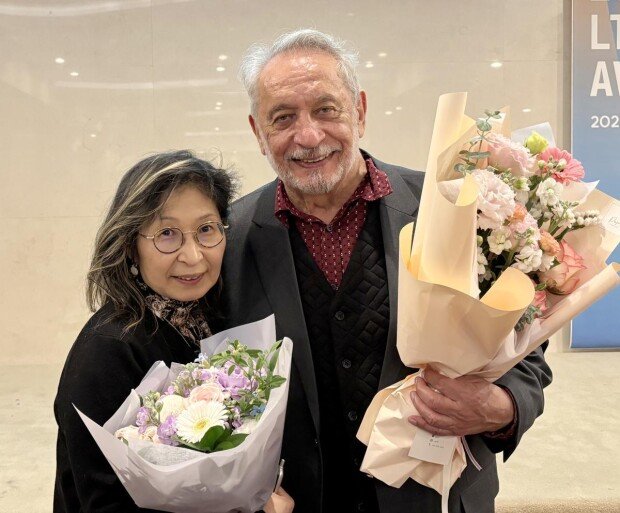French professor publishes book titled 'The Astonishing Koreans'
French professor publishes book titled 'The Astonishing Koreans'
Posted April. 08, 2025 07:20,
Updated April. 08, 2025 07:20

A French professor says his fascination with Koreans goes beyond mere surprise—he feels genuine awe. Jean-Claude de Crescenzo, who founded the Department of Korean Studies at Aix-Marseille University in 2003, has spent decades immersed in Korean culture. He is married to a Korean woman, has a Korean daughter-in-law, and even has a Korean name—Jang Guk-do—making him a true pioneer of the Korean Wave in Europe.
On March 31, Professor de Crescenzo published The Astonishing Koreans, an essay collection filled with cultural observations and anecdotes. In a video interview conducted Friday, he was joined by his wife, Professor Kim Hye-kyung, who also teaches Korean Studies at Aix-Marseille University. The couple currently resides in Aix-en-Provence, southern France.
“In Korea, they slap your butt before giving you a shot,” he said with a laugh. “It’s one of those things I could never quite get used to. They do it to distract the patient from the pain—it’s quite amusing.”
The book includes more than 100 such episodes, each offering insight into everyday Korean life. “My goal wasn’t to explain Korea itself, but rather to understand Koreans,” said de Crescenzo. “There are many books about the country, but few that truly explore the people.”
A frequent visitor to Korea, he travels two to three times a year and is known for his packed schedules—sometimes attending two or three meetings a day. His book is a product of years of keen observation and countless conversations with Koreans across all walks of life.
One anecdote in the book recounts his curiosity about how Koreans write. He noticed that Korean writers tend to rest their pinky fingers on the paper. This observation led him to study how Korean children are taught to write, and how the square shape of Hangul syllables influences writing technique.
In 2011, he established his own publishing company—Éditions de Crescenzo—introducing Korean authors such as Han Kang, Eun Hee-kyung, Jeong Yu-jeong, and Kim Ae-ran to French readers. Together with his wife, he translated Voyage à Cantant by Lee Seung-U, earning the Grand Prize at the 2023 LTI Korea Translation Award.
According to literary critic Kang Dong-ho, 242 Korean literary works were translated and published in France between 2012 and 2024. Of those, 53—an impressive 21.5 percent—were published by de Crescenzo’s press, an extraordinary contribution for a single publishing house.
Professor Kim, who currently serves as director of the Asian Studies Institute at Aix-Marseille University, noted the growing interest in Korean Studies. “These days, it’s the most competitive major to enter,” she said. “We accept 75 students, but over 2,000 apply each year. This year, we’ve increased the cap to 100.”
“Korea is a country where poetry books become bestsellers,” Professor de Crescenzo added. “When you see the sales numbers and sheer volume of poetry published, it’s astonishing. That kind of literary enthusiasm is unimaginable in France. Even though people say Korean literature is struggling, I believe the Korean spirit still cherishes poetry. Literature will find its place again in Korea.”
김소민 기자 somin@donga.com






![17년 망명 끝에, 부모 원수 내쫓고 집권[지금, 이 사람]](https://dimg.donga.com/c/138/175/90/1/wps/NEWS/IMAGE/2026/02/18/133376197.3.jpg)
